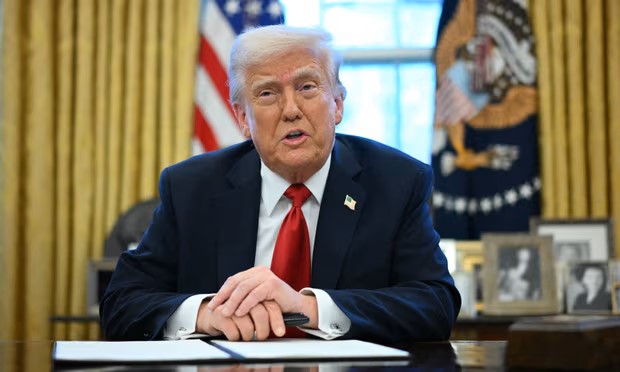
The specter of an all-out global trade war loomed large late Monday as U.S. President Donald Trump threatened to impose crushing 104% tariffs on Chinese imports – a move that would effectively double costs for American businesses importing goods from China. The dramatic escalation comes just one week after Beijing implemented retaliatory 34% tariffs on $60 billion worth of U.S. products, setting off a dangerous economic confrontation between the world’s two largest economies.
The White House issued an ultimatum demanding China withdraw its new tariffs within 48 hours or face the unprecedented combined tariff rate. “When China and others take advantage of American workers and businesses, I will always fight back – and fight back much harder,” Trump declared during an impromptu press briefing. “These massive new tariffs will remain until China stops its unfair trade practices once and for all.”
The announcement triggered panic across global financial markets:
- Asian markets suffered historic collapses, with Hong Kong’s Hang Seng Index plunging 13.2% to its lowest level since 1997 and Taiwan’s TAIEX dropping 9.7% to record lows
- European exchanges saw Germany’s DAX plummet nearly 10% at opening while London’s FTSE 100 hit a 12-month low
- Wall Street opened sharply lower, with the Dow Jones Industrial Average down 4.4%, S&P 500 falling 4.7% and Nasdaq Composite dropping 5% by midday
Chinese officials blasted the U.S. measures as “economic terrorism” during an emergency press conference. “This reckless action represents the worst kind of protectionism and unilateralism in modern history,” declared Commerce Minister Wang Wentao. “China will take all necessary measures to defend our national interests and the multilateral trading system.”
The European Union attempted to broker calm, proposing a “zero-for-zero” tariff compromise to avoid being drawn into the conflict. However, Trump simultaneously threatened 200% tariffs on European alcohol and 50% duties on Canadian steel and aluminum if allies “side against American interests.”
Economists warn the escalating tensions could derail fragile global economic recovery, with Morgan Stanley analysts predicting potential 2-3% reductions in worldwide GDP growth if the tariff war continues through 2025. The IMF is reportedly preparing emergency meetings to prevent full-blown economic warfare between the major powers.
As businesses worldwide scramble to adjust supply chains and pricing models, the coming days will prove crucial in determining whether diplomacy can prevail or the world will enter a new era of destructive trade conflict with consequences for consumers, workers and economies across the globe.







